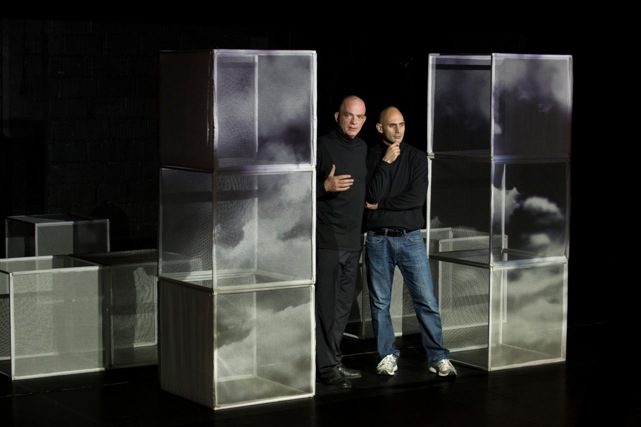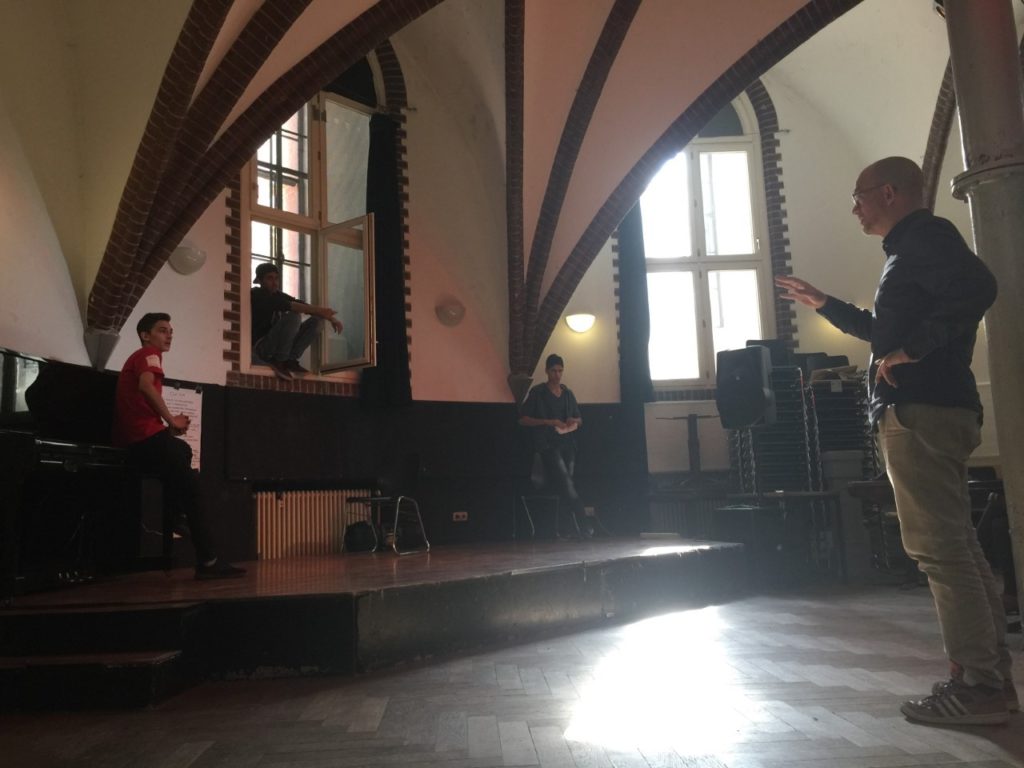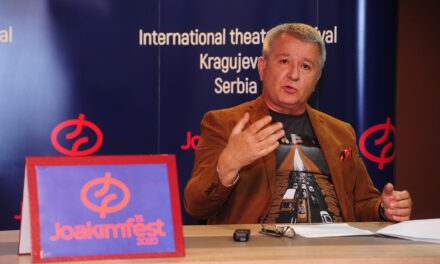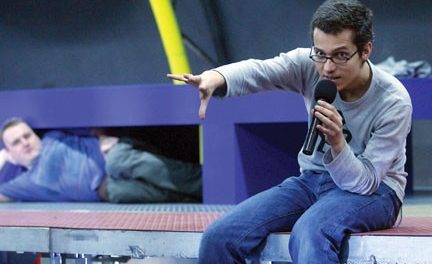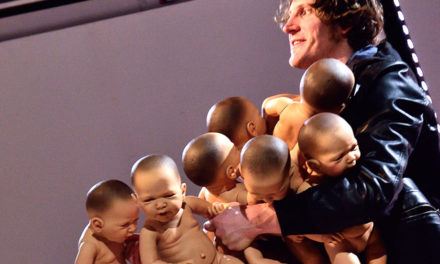Alexander Schroeder has been working for the last fifteen years in the acting department at the University of the Arts in Berlin. During that time, he has also been teaching at universities in Salzburg, Leipzig, Dresden, Hannover, Weimar, Stuttgart, Cairo, and other places. He also has been acting and directing in the Berlin theatre scene for the past thirty years. He was an assistant director and member of the Schaubühnen-Ensemble and has worked with Peter Stein, Peter Zadek, Andrea Breth, Luc Bondy, Klaus Michael Grüber, Thomas Ostermeier, and others. In 2015 the productions he participated in as a writer and actor won various awards: Jobs in Heaven (produced by posttheater) won the Stuttgarter Theaterpreis award; and Das Projekt bin ich (The project is me) won the German radio award, the Hörspielpreis der ARD.
In January 2016 Schroeder started working with refugees at the Tempelhof refugee center in Berlin. Tempelhof is a defunct airport that is now one of the biggest refugee centers in Germany. Set up to host up to 7,000 people, as of March 2015 it housed 2,000 and has 450 employees. The center serves refugees who come mostly from Syria, Afghanistan, Iraq, and Iran, fleeing war, hunger, and prosecution. The center’s stated mission claims that the integration of refugees is a challenge that can only be achieved by using all community resources. Therefore it serves as the connecting point between the refugees and other community organisations that are willing to assist them. The German authorities inform asylum seekers that they are supposed to stay at Tempelhof only for a maximum of four weeks before being transferred to other locations, but many find themselves stuck there for up to six months, with no other prospects. This is the community that Schroeder visits once weekly to work with refugees who are interested in expressing their narratives through theatre. The number of refugees who attend his workshops vary between five and thirty. His five core members are refugees from Syria. In addition to leading workshops, Schroeder has also been introducing this core group to Berlin theatre productions.
For Schroeder, knowing about these refugees via the media was not enough. He chose to meet them firsthand and to establish a theatre group. Entering a refugee center in Germany is difficult because of the security threat posed by the country’s extreme right-wing faction. Indeed, over a thousand attacks on refugee camps in Germany were reported in 2015. Without having secured official permission, Schroeder managed to get into the center via an emergency exit, after having failed to gain access through the main entrances. After entering illegally, he was granted access by officials only after some serious negotiations. Schroeder himself is the son of refugees. His maternal grandparents are Russians who fled the Soviet Red Army numerous times before arriving in Germany and becoming citizens during the 1950s. His paternal grandfather is from Alsace-Lorraine and had to leave his homeland after World War I when it became French; his paternal grandmother is Jewish and has a long family history of exile. Schroeder’s work comes from his desire to be the “host” he wishes his ancestors could have found when they moved to a new place. He was inspired by his family heritage and belief in the power of theatre to offer a platform for the disempowered to share their stories. He meets with his group in what he calls “open improvisation,” where the refugees talk and act out their personal stories that trace the time from their origins in Syria (or other home countries), their departures from home, and their arrivals at Tempelhof—with all the experiences they faced in-between.
The following interview took place in a cafe close to Tempelhof on 15 March 2016.
Fadi Skeiker: We hear a lot about refugee centers in Germany from the media. How would you describe the situation at the Tempelhof center?
Alexander Schroeder: It is an emergency center; it is not supposed to be a home for refugees to stay there for months or even weeks. The center started as a place for people to stay for some nights, and this is what most people are told when they arrive here. This is why you will see small rooms that house up to twelve refugees. There is no space beside the bunk beds, no chair, no table or something to store things in.
FS: So, they arrive directly from their trip across Europe to that center?
AS: That is true.
FS: They just left their traumatic experience before arriving here. It must be very vulnerable for them to take drama sessions right after their arrival.
AS: They actually have not left the traumatic experience—they are in the middle of the trauma still. They have not “arrived” yet. They are faced with questions such as: Where would I go next? How long should I wait? Should I continue my trip to one of the Scandinavian countries? Those who have been here for weeks are thinking about leaving again. For some, it seems even harder to wait and do nothing than what they had faced before. Some of them do not have documents and so it is not clear who they are in the eyes of the authority. Officials hesitate to give them full acknowledgement because they do not know who they are; the documents they give them when they arrive at the center reads something like “the person on this picture claims that he or she is . . .”
FS: You mean that many of them have not even started to file their asylum applications?
AS: True, some of them have not even started the process of applying for asylum until now; some of them do not have passports, especially Palestinians who fled Syria. Others lost their passports during their trip.
FS: I am sure it is such a challenge to do theatre with this particular community. Aside from the fact that they are still living their trauma, the fact that they might be moving from the center any minute will make it logistically difficult for you to work with the same group.
AS: Exactly so. In the last four sessions, we have been lucky to have the same group, but before that, different people would show up every single time.
FS: As a facilitator how do you handle that?
AS: In the first weeks, I was just offering an open space, where everybody could play whatever they wanted—what came into their minds spontaneously. It had no goal or specific theme; it was nothing but showing something that the others watched, a platform for them to be visible. It was enough in itself and not aiming to be more. Building their trust in me while doing that, I found participants who are interested in going further, who would like to open up more and more and would be able to maintain concentration for the sake of being able to do a public show in the end.
FS: I thought your work is process-based, and that you are not interested in having a final presentation?
AS: So far, it has been only process, but there are ample opportunities for something to come out of it. In our last sessions, they have been talking about their personal experiences with humiliation, and it has become much more intense because they are starting to talk about personal stories that they have not told to anyone—even their mothers and friends do not know about these stories. I believe that these stories could potentially be of interest to a lot of people to get a better understanding about their situations. So far, we are just working on trust, feeling safe, having the right to talk their minds, and making them reach the point where they do not need to hide the fact that they are vulnerable.
FS: I am curious to learn more about the logistics of your meetings with them. You meet once a week only? Do you see them outside drama sessions?
AS: We meet officially once a week, but they want to meet more often; they did not want to stop talking and sharing, so I now try to come at least twice a week. I also take them to other parts of Berlin, show them my favorite cafes, markets, parks, etcetera, so that they feel a bit more conscious about the city they live in, even though they might not stay in it. Theatre work with refugees is not only about process drama, leading workshop, or creating a performance, it is also a social and psychological work—maybe it’s even therapy. It is important to me to be approachable, to be able to connect with them. Having said that, I do give them a structured theatre workshop; I give them advice also on theatre skills, such as how to fight on stage without getting hurt. Nearly every time, their improvisations end in a scene of physical violence; violence comes up as a result of the abuse of power or the resistance against the abusive power—closely related to their encounters with the police or security in Syria or in Germany. Violence is the recurring theme. Now, the focus of our work, and the challenge is getting more and more orientated to telling their personal stories that might not be related to violence.
FS: What are the techniques that you use to encourage them to tell their stories? Are there any particular questions you pose to get them talking? And how do you move on after they share their stories?
AS: I ask them questions such as: What was the best moment on the run—while you felt something good? What did you hear about Germany when you were a child? What do you miss most about your country? If we come to the point of making a public performance with this material there will be no explicit lines to remember, but they will stay with the heart of the story, in their own words—in words, which can change from rehearsal to rehearsal and from performance to performance.
FS: While I lead applied theatre workshops with refugees myself, I feel that sharing personal narratives might have therapeutic effects. Do you sense that while working with them?
AS: Indeed, personal storytelling may be close to therapy because participants are allowed to say everything, but it is also different from individual therapy. There are many people present at the workshop: there is me, the translator—her name is Raghda—there are some people who come and observe our work. Also, I am not a therapist and I am not giving advice; I am just a human being who is passionately listening to what they have to say. I am offering attention, not help. But this can help, I hope. So it can be therapy, but the main focus is just on being visible to others, it is about escaping being a number, escaping the perception of being a drop in a flood. Helping to give a better sense of self-awareness, increasing their self-esteem and perception of just not being alone.
FS: While observing your work I notice that you speak in German, and then Raghda will translate what you said into Arabic. How do you feel about translating in this kind of work? Does it hinder direct communication? Can it have positive effects?
AS: Even though translation can take a big portion of the time, it has a positive effect because workshop participants . . . need to concentrate on what they really want to say. Maybe, while they are telling an emotional experience, it might affect them and make them cry, but with translation it keeps them focused on being understood. Their experiences can come to a point where they are getting shut down, they do not want to talk about it, but then when they know that their words are going to be translated they organize their thoughts and share. The translation, therefore, becomes something valuable: their stories become better constructed, logical, and even intellectualised and. . . . This also helps so that their stories do not take them away emotionally, as they might in individual therapy situations where usually only one person is listening and they can talk without interruption.
FS: What is your goal in doing this work with them?
AS: It is first of all to create a place where they can escape the senselessness of their current situation. As I told you, they are in a state of waiting, and they need to be engaged in something while they are waiting for their paperwork to be processed. They are so tired of killing time. During their work with me, they escape from their waiting zone; they escape being in a room with many people. I want them to be better at understanding themselves, to be more self-conscious and boost their dignity. In the long run, I want Germans to get a glimpse of their [refugees’] personal histories so that the perception of the German public . . . becomes a bit more personal and not just influenced by media reporting. Through the eyes of one person, you can understand more than through the information disseminated about millions of refugees in the media.
FS: So you insist in your work on exposing the personal experiences of the refugees, and using them as sources of information about their reality rather than depending merely on media reporting. I agree with you. I even argue that one of the strengths of this kind of work is that it exposes the personal stories of the refugees to the German public. However, this exposure does not jeopardize the refugees’ privacy, as in the case of mainstream media. . . . Do you focus on any other themes or artistic elements other than the personal narration?
AS: Sure, there are many other things coming up that can be explorations. For example, they start singing German folk songs, and they sing them with such charm. They also sing their own songs; there is lots of music on their minds that will be part of the theatre performance, which hopefully will take place one day. Also, sometimes the personal and theatrical are suddenly intertwined. For example, [when] one of them started to tell a story about the way he was beaten up, the whole group started collectively to be beaten by imaginary fists; their improvisations could have theatrical possibilities that transcend the personal story to achieve an aesthetic value. In such a moment the personal becomes common—and one day, I hope, public.
FS: Where do you see your work going?
AS: I have no idea. I just feel that it is something we have to do; it is important and good, every little second. My goals keep changing. At the beginning, the goal was not to perform because we had different people every single day and I did not want to create any kind of pressure, so there was not a chance to think about a performance. But recently, people came back with the intention that they want their stories to be heard publicly; one of the boys even said that he wants us to form a group and name it “Diaspora.” Do we want to have a performance? Today, yes—a week ago, no. For now, I just want to give them a safe space to talk, express, create, and change.
Copyright © <2016> Johns Hopkins University Press. This article first appeared in Theatre Topics, Volume 26, Issue
3, November, 2016. Reposted with permission of the author.
This post was written by the author in their personal capacity.The opinions expressed in this article are the author’s own and do not reflect the view of The Theatre Times, their staff or collaborators.
This post was written by Fadi Fayad Skeiker.
The views expressed here belong to the author and do not necessarily reflect our views and opinions.

